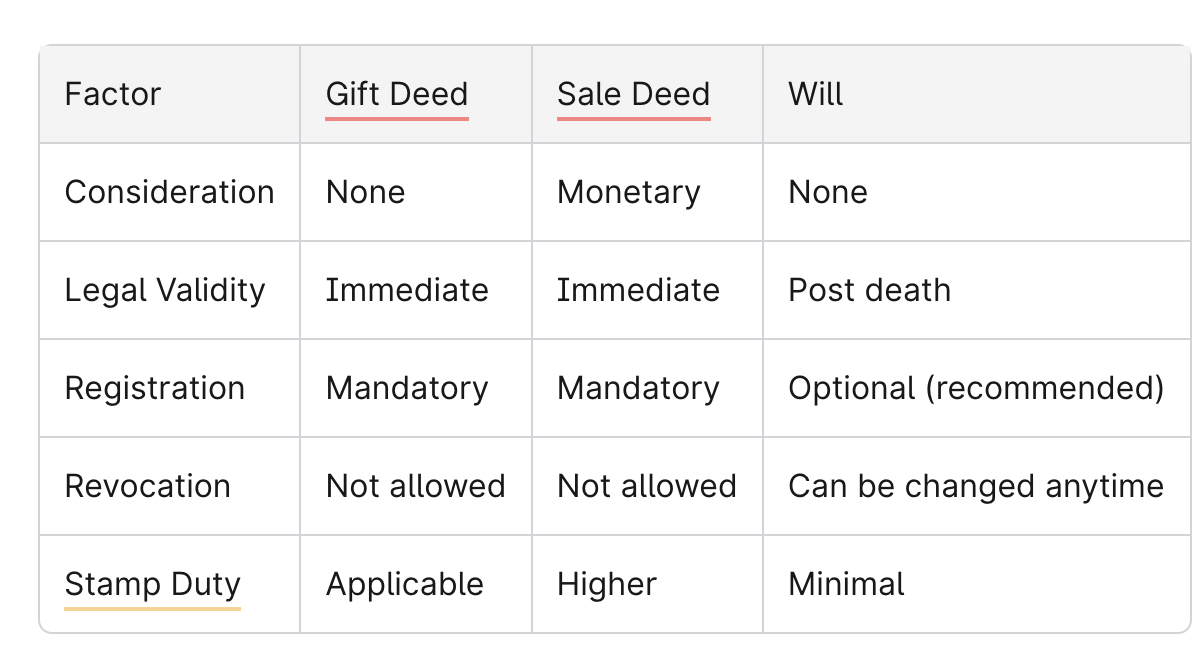In India, gifting property—especially ancestral property—within families is common, but not always straightforward.
A Gift Deed is a legally recognised instrument that enables the voluntary transfer of immovable property or movable properties from one person (the donor) to another (the donee) without monetary consideration. While gifting self-acquired property is relatively simpler, Gift Deeds for ancestral property bring in a layer of legal complexity.
In this article, we’ll walk through everything you need to know: the meaning of a Gift Deed, its registration process, tax implications, and precautions to avoid future disputes, all within the framework of the Transfer of Property Act, the Income Tax Act, and the Indian Registration Act.
What Is A Gift Deed?

A Gift Deed is a legal document used to voluntarily transfer ownership of property without any monetary exchange.
It is governed by the Transfer of Property Act, 1882, and becomes effective only after Gift Deed registration is completed.
Gift Deed Meaning
A Gift Deed outlines:
- The details of the donor and donee
- Description of the gift property
- Confirmation that the transfer is voluntary and without coercion
- A statement that the gift is made without monetary consideration
- The acceptance of the gift by the donee
Can You Gift Ancestral Property?

Yes—but only if the property owner has a rightful and transferable interest in the ancestral property. The gift of ancestral property must follow specific legal requirements:
- The donor must be the lawful owner with authority to transfer ownership.
- If the property has not been partitioned, the consent of other coparceners (usually sons, daughters, and grandchildren) may be required.
- In a Hindu Undivided Family (HUF), gifting ancestral property without others’ consent can be legally challenged.
Key Legal Frameworks

1. Transfer of Property Act, 1882
This act mandates that the transfer of immovable property through a Gift Deed must be:
- In writing
- Signed by the donor
- Attested by two Witnesses
- Registered at the sub-registrar’s office
2. Indian Registration Act, 1908
Mandates the registration process, ensuring:
- Legal proof of the transfer
- Protection from undue influence and fraud
- Issuance of a registration certificate
3. Income Tax Act, 1961
Covers the tax implications of the gift:
- Gifts from specified relatives (eg, parents, spouse, siblings) are exempt from income tax under Section 56(2)(x).
- Gifts exceeding Rs 50,000 from non-relatives may attract taxes.
Gift Deed Registration: Step-By-Step

1. Drafting the Gift Deed
Create a Gift Deed using the correct Gift Deed format with:
- Donor and donee details (including identity proofs)
- Property details (residential, agricultural land, etc)
- Statement of voluntary gift without coercion
- Clause for acceptance by donee
- Optionally, a revocation clause
2. Calculate and Pay Stamp Duty
Stamp duty varies depending on:
- The state where the property is located
- Gender of the donee (some states offer discounts for women)
- Type of property (urban/rural, residential property, etc)
You must also pay registration fees (usually around 1% of the property’s market value).
3. Visit the Sub-Registrar’s Office
- Submit the draft deed, title deed, and encumbrance certificate
- Pay stamp duty payment and registration fees
- Both the donor and donee must be physically present
- Bring two Witnesses
4. Deed Execution and Registration Certificate
- Sign and execute the deed before the sub-registrar
- Once approved, a registered Gift Deed is issued
Stamp Duty & Charges: State-Wise Snapshot

Note: Always check the latest stamp duty rates and rules for your state.
Income Tax Implications

When Gift Tax Is NOT Applicable
Under the Income Tax Act, no tax is levied on property gifts received from:
- Parents
- Siblings
- Spouse
- Lineal ascendants or descendants
When Tax IS Applicable
- If property gifted to a non-relative exceeds Rs 50,000, the stamp duty value is taxed as income from other sources.
- If the gift includes movable properties like shares or jewellery, tax rules may differ.
Advantages Of Using A Gift Deed

- Immediate Transfer of Ownership: Unlike a Will, which takes effect only after death
- Minimises Disputes: A registered Gift Deed provides legal proof
- Tax Benefits: No tax between specified relatives
- Avoids Probate: Unlike a Will, no need for probate court intervention
Risks & Precautions
1. Future Disputes
If not properly executed, Gift Deeds can lead to:
- Claims from other legal heirs
- Allegations of undue influence
- Questions around the donor's mental capacity
2. Revocation Limitations
Once a Gift Deed is registered, it is legally binding and cannot be revoked unless:
- There is a revocation clause in the deed
- It is proven in court that the gift was made under fraud or coercion
3. Partitioned vs Unpartitioned Property
- If the ancestral property has not been formally partitioned, gifting it unilaterally may not be valid
Documents Required For Gift Deed Registration

- Drafted Gift Deed
- Identity proof (Aadhaar, PAN) of donor and donee
- Property title documents
- Encumbrance certificate
- Two Witnesses with identity proof
- Stamp paper as per applicable rate
- Photographs of all parties involved
Gift Deed vs Sale Deed vs Will


FAQs On Gift Deeds For Ancestral Property

Q1: Can ancestral property be gifted without the consent of legal heirs?
A: No, if it is unpartitioned, consent of other coparceners is required.
Q2: What if someone challenges a Gift Deed in court?
A: They must prove coercion, fraud, or lack of legal authority to transfer the property.
Q3: Can a Gift Deed be revoked?
A: Only if there's a valid revocation clause, or if fraud/coercion is proven in court.
Q4: Is it better to gift or bequeath property?
A: It depends. Gifting ensures immediate transfer; Wills offer flexibility until death.
The Bottom Line: How Yellow Can Help

A Gift Deed can be a powerful tool for property transfer, especially within families. But when it comes to ancestral property, extra care must be taken to ensure the gift is legally valid, tax-efficient, and free from future complications.
From choosing the right Gift Deed format, to ensuring proper Gift Deed registration, paying the correct stamp duty, and confirming your legal rights under the Property Act, every step counts. Always consult a legal expert before executing a Gift Deed for ancestral property to ensure you’re compliant with the Income Tax Act, Indian Registration Act, and Transfer of Property Act.
By doing so, you not only secure the smooth transfer of property but also safeguard your family’s future and legacy.
At Yellow, we can help you with all aspects of estate planning, including Wills, Trusts, Powers of Attorney, Gift Deeds, Legal Heir and Succession Certificates, and Living Wills. We also offer post-demise and asset transfer services. Our team of legal experts has more than 50 years of combined experience.




